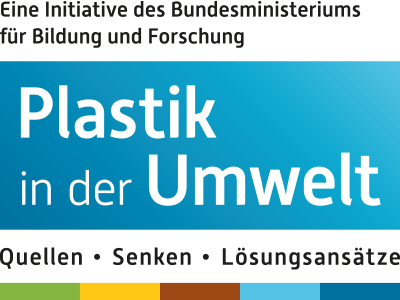The spectrum of topics covered by this research focus ranged from the improvement of certain plastic materials with regard to their environmentally compatible degradability, the investigation of entry points into water bodies and the analysis of possible toxic effects on aquatic organisms to strengthening the environmental awareness of consumers. As main end-users and implementers of innovations, companies were involved in the development and realization of research projects right from the beginning.
The research projects was structured into five thematic areas, which are aligned along the entire lifecycle of plastics:
1. Green Economy
2. Consumption
3. Recycling
4. Freshwater ecosystems (limnic/standing water systems)
5. Saltwater ecosystems (marine/ocean systems)
In the framework of a green economy, the private sector has a multitude of approaches to reduce the entry of plastics into the environment. There is potential along the entire value chain, from polymer design and production through the use phase and disposal/recycling to collection and use of floating sea trash as a basis for new products. An analysis of the “leaks” through which polymers leave their closed lifecycle – as well as exploration of solutions for closing those gaps – previously did not exist. This was elaborated within the framework of this research focus, together with relevant actors from affected sectors.
From a social-ecological perspective, the focus on plastics – aside from production and commercial handling – should be on consumption. This involves e.g. changing the unencumbered use of plastics, testing the acceptance of plastic alternatives, and removing microplastics from indispensable consumer products (tooth pastes, shower gels, etc.). Consumers can also contribute to higher plastic recycling rates. Finally, testing which positive effects result from reduction in plastic production and use of plastic goods constituted another research factor in this vein.
Recycling contributes significantly to avoidance of plastics’ departure from the economic value chain into the environment and thereby into marine ecosystems. However, previous research on microplastics has shown that recycling as a whole should be differentiated. The research contributed ways of weighing positive aspects of various types of plastic recycling against the intensification of the microplastics problem they may be causing, as well as the pros and cons of plastic waste management through combustion (burning).
Research on plastics in freshwater systems features only few isolated investigations; an overall understanding of plastics’ points of entry, their spread, and the resulting effects on aquatic biology (including risk analysis for humans) previously did not exist. The projects in this research focus closed parts of this knowledge gap and painted a more concrete picture of the complete scope and impact.
Oceans end up as the constant and central “sink” of the plastics lifecycle. Although more research has been done on (micro-) plastics in marine systems compared to freshwater systems, the state of knowledge on oceans is still patchy. The projects in this area of the “Plastic in Environment” research focus concentrated on the Weser and Warnow river watersheds, including their estuaries and coastal waters.
